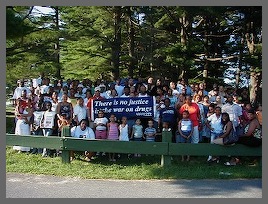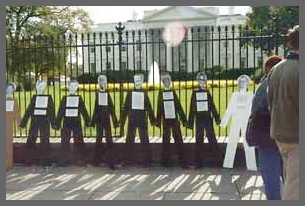
Journey for Justice: Detroit, MI 2002
Many public meeting places have equipment you need, and there are other considerations besides equipment. Where in your community is there a central meeting place? Does it have adequate parking, and is it easy to find? Is it near public transportation? Most cities offer rooms or auditoriums that local groups can use free of charge. If you call for a street rally or demonstration, will it be a place where the public can see you?

Isidro Aviles Memorial Picnic: New York City 2006
If the weather is fair and predictable, a park is a good setting for a rally or member’s picnic.
Colleges and civic groups are full of opporutunities to link issues, and they often have access to places where you can co-host public events. Make links in your community!
To use a public building or school, you may be required to fill out paperwork. Politely ask, "Is there any paperwork?" You may be charged a small fee.

Journey for Justice: Washington, DC 2002
You should inspect the facility or area you plan to use. If it's a building, it should be clean and large enough to hold the audience you expect to attract -- looking full, not empty. I's better to err on the side of not having enough space as opposed to a small group, in a large room.
Make a list about what is good, and what isn’t great about the places you're contemplating.
Is it accessible to handicapped people with good parking, and in a convenient area where people you've invited can move with ease?
If you are planning a demonstration, is the public space visible? Will it require a permit? Again, is it an area convenient to your volunteers and visible?
You will need to publish preciset driving directions, and depending on your area, driving directions from a multitude of directions. You must also know bus routes and any other mass transit instructions. This information can be posted on community calendars. General but clear instructions should be published on any flyers, and for local newspaper event listings.
